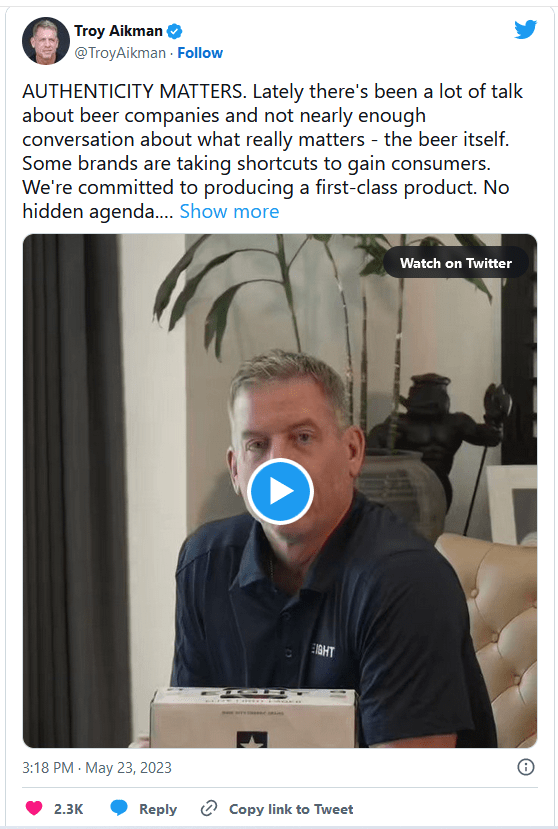By Jeff Haden
Eight co-founder Troy Aikman on brand positioning, marketing, and keeping your message as simple as possible.
Plenty of stories (including many I’ve written) describe start-up launches. But what you rarely see are stories about the middle stages of a company’s life, a period that in many ways is more difficult than the start-up phase. Achieving — and managing — steady growth. Expanding your team. Building a solid infrastructure. Creating the right culture.
For many founders, that’s when the leadership and business rubber really hits the road.
That’s why, starting in 2017, I regularly checked in with Vuori founder Joe Kudla. (If you aren’t familiar, Kudla turned $700,000 in “friends and family” seed money and a dream into a clothing brand valued at $4 billion.
And that’s why I regularly check in with Hall of Fame quarterback and ESPN MNT analyst Troy Aikman, the co-founder of Eight, a “better for you” beer made with organic grains and antioxidant-rich hops, and without adjuncts, fillers, or sugars. Eight is the most successful independent beer ever launched in Texas, and currently the top-selling beer in the “craft” segment.
But that also means one of the brand’s next challenges is avoiding a sophomore slump, when public attention generated by a product’s launch subsides and customers are often lured away by other product launches. (“New” is great, but by definition doesn’t last forever.)
Often, brands — “sophomore” as well as established — employ a variety of advertising strategies. Partnering with influencers. Targeting a specific market segment. Publicly embracing a particular social cause.
Aikman’s approach is juuuust a bit simpler.
“I like to pare things down to their simplest form and approach,” Aikman says. “That’s how I was as a player, and how I’ve been in business. All I know is we’re working our tails off to make a great beer, and we’ve done that. I’m proud of it, and the rest of it is just a lot of conversation that really doesn’t matter.”
“As a company that is young and hungry like we are,” he says, “the message is that if you want to align with a company that’s focused on one thing, making great beer, then come join team Eight.”
As for spreading that message — industry analyst IRI considers “better-for-you” demand an industry tailwind — the key is also simple: work even harder. While Aikman spends considerable time meeting with distributors, vendors, and customers, as well as attending industry events, his presence is the icing, not the cake.
“We’ve done a lot of testing as far as what resonates with people when they think of Eight beer,” Aikman says, “and what has hit home is that it’s not my involvement. It’s also not some loose association with the Cowboys. What resonates is that we are a low calorie, low carb, all organic beer. That was the best news I could have heard, because like any product, the beer has to stand on its own, especially as we move outside of Texas.”
As for expanding beyond Texas, six months ago Aikman thought the brand would expand to border states since infrastructure and fulfilment would have been relatively simple. Today he’s focused solely on Texas.
“As well as we’ve done in Texas,” he says, “our overall brand recognition in the state is only 15 percent, so there’s still tremendous growth potential. Distributors in other states constantly ask when we’re coming, and that’s great. But still: I’d much rather be pulled into markets, rather than pushing, and the better job we do in Texas, the more likely that is to happen.”
Which might be the best way for your startup to manage a sophomor slump. Sure, you can fuel growth through more — or more “creative” — advertising, but higher customer acquisition costs could result in unprofitable growth. You could fuel growth by spreading into new territories or markets, but that often mean starting over in terms of gaining brand awareness, something that is much harder than expanding from an established base.
Or you could forget what made you successful in the first place, and complicate what should be a simple message: the problem you solve or need you meet, in a way that makes you different from any other brand — because that’s what really resonates with customers.
Everything else? It could just be a lot of conversation that doesn’t matter.
Feature Image Credit: Troy Aikman. Photo: Arturo Holmes/WireImage


